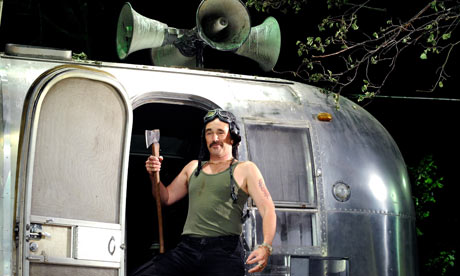From Fantasia, the opening of Walt Disney’s animated interpretation of The Rite of Spring, with the music performed by Leopold Stokowski and the Philadelphia Orchestra:
Archives for April 2011
TT: Almanac
“The trouble with music appreciation in general is that people are taught to have too much respect for music; they should be taught to love it instead.”
Igor Stravinsky, “Subject: Music,” (New York Times Magazine, Sept. 27, 1964)
TT: Just about there
Dress rehearsals for Danse Russe, my new operatic collaboration with Paul Moravec, start today. If you’re only just joining us, Danse Russe is a backstage comedy–yes, a comedy–about the creation of Igor Stravinsky’s The Rite of Spring. It opens in Philadelphia on Thursday night.
I don’t know whether I’ll have time to do any more blogging prior to the first performance. In case I’m too busy or preoccupied, I’ve already posted, in addition to a week’s worth of Stravinsky-related almanac entries, a series of relevant daily videos that I hope will divert you.
Now, if you’ll excuse me, I’ve got work to do….
* * *
For more information about Danse Russe, or to order tickets, go here.
To listen to an episode of WNYC’s Soundcheck in which Paul Moravec and I talk about Danse Russe, go here.
TT: Apropos of Danse Russe (I)
Pierre Monteux conducts the London Symphony Orchestra in a 1961 performance of Paul Dukas’ The Sorcerer’s Apprentice. Monteux conducted the first performance of The Rite of Spring in 1913 and is a character in Danse Russe:
TT: Almanac
“My freedom will be so much the greater and more meaningful the more narrowly I limit my field of action and the more I surround myself with obstacles. Whatever diminishes constraint diminishes strength. The more constraints one imposes, the more one frees one’s self of the chains that shackle the spirit.”
Igor Stravinsky, Poetics of Music
TT: Down and out in London and New York
Let the bad times roll: I review two more Broadway stinkers, Jez Butterworth’s Jerusalem and the stage version of Sister Act, in today’s Wall Street Journal. Here’s an excerpt.
* * *
“Jerusalem” is pretentious almost without limit, a three-hour save-our-England tract in which the uplift is slathered with a thick brown sauce composed of two parts coarse humor and one part pseudo-poetry. In addition, “Jerusalem” features a performance by Mark Rylance (“La Bête,” “Boeing-Boeing”) that is every bit as good as the critical buzz that accompanied it to Broadway from London’s West End. Connoisseurs of great acting won’t want to miss him–but those with normal attention spans will be hard pressed to make it all the way to the finish line.
 Mr. Rylance plays Johnny “Rooster” Byron, a booze-sodden drug dealer and teller of tall tales who would be known in England as “Falstaffian” or “Rabelaisian” and in America as “trailer trash.” He lives in a moldering Airstream parked in a forest on the edge of a real-estate development whose occupants, not at all surprisingly, are trying to have him evicted. Rooster is the unofficial godfather of a merry band of working-class louts whom he lovingly describes, in one of his more printable turns of phrase, as “educationally subnormal outcasts.” They flock to the enchanted forest to drink his drink, snort his coke, have casual sex and forget their Lives of Loud Desperation, about which they are inclined to give lengthy speeches when sober.
Mr. Rylance plays Johnny “Rooster” Byron, a booze-sodden drug dealer and teller of tall tales who would be known in England as “Falstaffian” or “Rabelaisian” and in America as “trailer trash.” He lives in a moldering Airstream parked in a forest on the edge of a real-estate development whose occupants, not at all surprisingly, are trying to have him evicted. Rooster is the unofficial godfather of a merry band of working-class louts whom he lovingly describes, in one of his more printable turns of phrase, as “educationally subnormal outcasts.” They flock to the enchanted forest to drink his drink, snort his coke, have casual sex and forget their Lives of Loud Desperation, about which they are inclined to give lengthy speeches when sober.
What we have here is, in short, the theatrical counterpart of what is known to literary scholars as a “condition-of-England novel,” a genre long beloved of those who prefer politics to art. Mr. Butterworth has upped the ante still further by adding a stiff dose of middle-class self-loathing à la George Orwell, who famously declared in “Nineteen Eighty-Four” that “if there is hope, it lies in the proles!” That deluded sentence could well stand as the epigraph of “Jerusalem.” Like Orwell’s “proles,” Rooster Byron (get it?) is in touch with the instinctual life of sex, drugs and rock ‘n’ roll. This, of course, makes him infinitely more authentic than the prim homeowners who want to give him the push….
The season isn’t over yet, but I’m already guessing that “Sister Act” will walk away with the Bottom of the Barrel Prize for 2011. While the original 1992 screen version of “Sister Act” wasn’t the worst movie ever made, the musical-comedy version that arrived on Broadway after successful runs in Pasadena and London is a wretched piece of rhinestone-spangled junk….
* * *
Read the whole thing here.
TT: Just because (I)
Pierre Boulez conducts Stravinsky’s Rite of Spring:
TT: Just because (II)
Michael Colgrass talks about recording The Rite of Spring with Igor Stravinsky on the podium:
